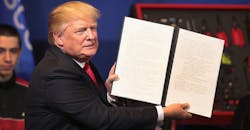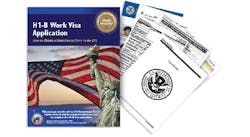Cuts to Skilled Immigration Degrade a US Strength
The battle over tariffs may indicate that President Donald Trump has moved on from the immigration issue. When Democrats stymied Trump’s plans to curtail family-reunification immigration, the chances of major legislation dropped substantially. But that doesn’t mean that Trump is having no effect on immigration. Through a combination of executive actions and rhetoric, the president is deterring exactly the kind of immigrants that the U.S. most critically needs to keep its economy running.
Since coming into office, Trump has been making life harder for skilled foreigners working in the U.S. Trump temporarily suspended premium processing of H-1B visas, one of the main visas skilled workers use to enter the country. The only possible reason for that move was to harass visa applicants. Trump’s administration has also made it harder to give the visas to entry-level computer programmers, and increased its scrutiny of companies that hire workers on H-1Bs. As a result, the pace of H-1B approvals showed signs of slowing last year.
The decline in the percent of accepted applications suggests that the skilled worker drought isn’t simply due to the atmosphere of racial exclusion created by Trump’s rhetoric, or to the recent increase in hate crimes.
Thanks to Trump’s restrictive policies, skilled workers from countries such as India are turning to Canada instead. Canada, where the racial anxieties of Trump’s base are notably less prevalent, admits much greater numbers of high-skilled immigrants relative to its population. In 2017, it increased its intake of skilled workers by about 7.5 percent, and announced a new program to approve visas for these workers in two weeks -- compared to six or seven months in the U.S.
So far, these trends have received little attention. Skilled immigration isn’t the kind of issue that gets masses of activists marching in the streets. Democrats tend to focus on protection for undocumented immigrants. Republicans used to pay lip service to the idea of skilled immigration -- and some still do -- but spend the vast majority of their energy on trying to curb family-based legal immigration. Meanwhile, tech companies support more H-1Bs, but some workers oppose the program, believing that it steals jobs and/or reduces wages for native-born Americans.
This is a big problem, because skilled immigrants are a key part of the U.S. economy.
First of all, they’re highly entrepreneurial -- between 1995 and 2005, immigrants started more than half of the new businesses in Silicon Valley. As of 2011, more than 40 percent of Fortune 500 companies were started by immigrants or their children. It’s impossible to know ahead of time which immigrants will start these companies, but they’re much more likely to be those with decent technical training who come from families with a tradition of starting businesses -- in other words, skilled immigrants.
They’re also highly innovative. A 2017 study by economists Ufuk Akcigit, John Grigsby and Tom Nicholas examined patenting records, and concluded:
Technology areas with higher levels of foreign-born expertise experienced much faster patent growth between 1940 and 2000, in terms of both quality and quantity, than otherwise equivalent technology areas.
They go on to list a number of famous American inventions whose creators were born elsewhere.
As for driving down native-born Americans’ wages, there is evidence that the worry is vastly overblown. It’s true that the H-1B program tethers employees to their employers; for a worker on an H-1B to switch to a different company, the procedure can be time-consuming and annoying. There is some evidence that companies that win the chance to hire more H-1B workers pay lower wages. But there’s also evidence showing that H-1B workers are not paid less than native-born Americans, after accounting for their age and skill level.
Moreover, studies that find negative impacts of H-1Bs tend to look only at the specific companies that hire skilled workers. The presence of more smart people in an industry or a city cause new ideas and technologies to flourish. These then diffuse to companies, allowing business to innovate faster, hire more workers and pay higher wages. Skilled foreigners help keep new ideas flowing in technology clusters like Silicon Valley; Austin, Texas; and Raleigh, North Carolina.
In addition, having a thick market of smart workers in an area allows a lot of innovative companies to cluster there. Tech companies put their offices in high-cost California because that’s where the engineers live. And engineers move there because that’s where the companies are.
This is why even if they lower wages at a particular company, H-1B workers raise native-born wages overall. A 2015 study by economists Giovanni Peri, Kevin Shih and Chad Sparber found:
Increases in [foreign] STEM workers are associated with significant wage gains for college-educated natives. Gains for non-college-educated natives are smaller but still significant. Our results imply that foreign STEM [workers] increased total factor productivity growth in US cities.
If Trump’s immigration policies break this virtuous cycle, the tech industry could eventually decide to make its home elsewhere -- in immigrant-friendly Canada, or even in emerging economies of China and India. That would result in many fewer good jobs, and lower wages, for American workers -- skilled and unskilled alike.
The U.S. is playing a very dangerous game under Trump. By systematically degrading one of the nation’s core strengths -- the constant inflow of smart, entrepreneurial foreigners -- Trump is putting the native-born populace at risk, not helping it. Instead of limiting the H-1B program, the U.S. should replace it with a Canada-style system that gives green cards to skilled foreign workers. It may not get many people marching in the streets, but skilled immigration is an issue that matters for the future of every American.
by Noah Smith

